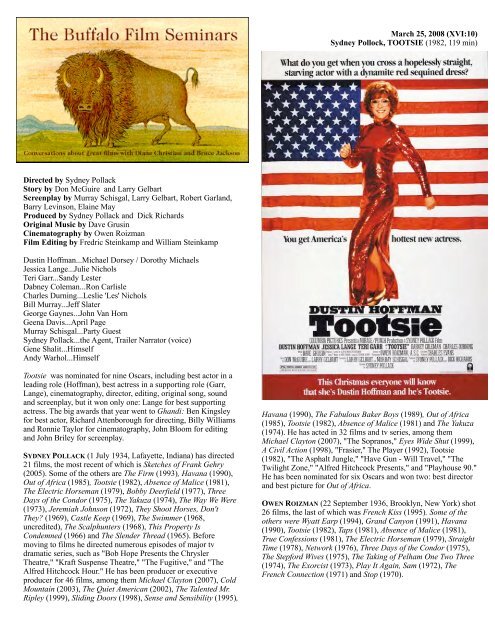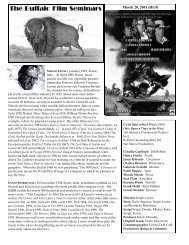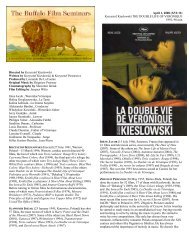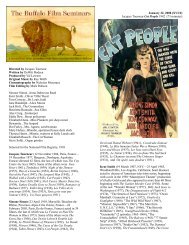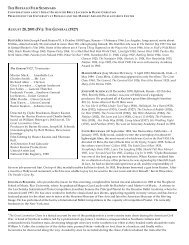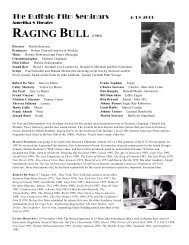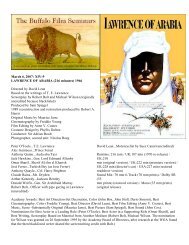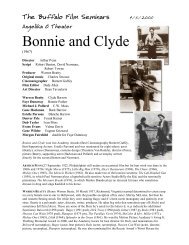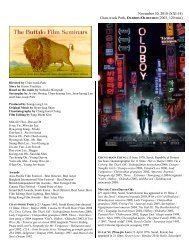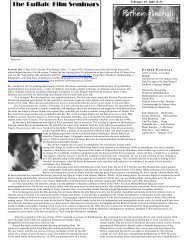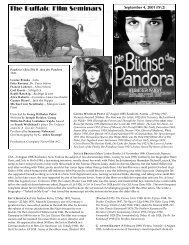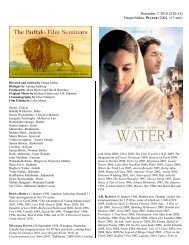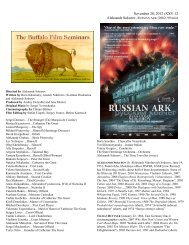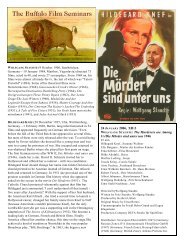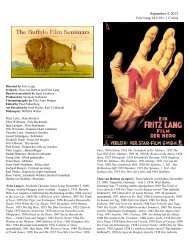Directed by Sydney Pollack Story by Don McGuire and Larry Gelbart ...
Directed by Sydney Pollack Story by Don McGuire and Larry Gelbart ...
Directed by Sydney Pollack Story by Don McGuire and Larry Gelbart ...
You also want an ePaper? Increase the reach of your titles
YUMPU automatically turns print PDFs into web optimized ePapers that Google loves.
Mervyn LeRoy Gold Diggers of 1933 19March 25, 2008 (XVI:10)<strong>Sydney</strong> Pollock, TOOTSIE (1982, 119 min)<strong>Directed</strong> <strong>by</strong> <strong>Sydney</strong> <strong>Pollack</strong><strong>Story</strong> <strong>by</strong> <strong>Don</strong> <strong>McGuire</strong> <strong>and</strong> <strong>Larry</strong> <strong>Gelbart</strong>Screenplay <strong>by</strong> Murray Schisgal, <strong>Larry</strong> <strong>Gelbart</strong>, Robert Garl<strong>and</strong>,Barry Levinson, Elaine MayProduced <strong>by</strong> <strong>Sydney</strong> <strong>Pollack</strong> <strong>and</strong> Dick RichardsOriginal Music <strong>by</strong> Dave GrusinCinematography <strong>by</strong> Owen RoizmanFilm Editing <strong>by</strong> Fredric Steinkamp <strong>and</strong> William SteinkampDustin Hoffman...Michael Dorsey / Dorothy MichaelsJessica Lange...Julie NicholsTeri Garr...S<strong>and</strong>y LesterDabney Coleman...Ron CarlisleCharles Durning...Leslie 'Les' NicholsBill Murray...Jeff SlaterGeorge Gaynes...John Van HornGeena Davis...April PageMurray Schisgal...Party Guest<strong>Sydney</strong> <strong>Pollack</strong>...the Agent, Trailer Narrator (voice)Gene Shalit...HimselfAndy Warhol...HimselfTootsie was nominated for nine Oscars, including best actor in aleading role (Hoffman), best actress in a supporting role (Garr,Lange), cinematography, director, editing, original song, sound<strong>and</strong> screenplay, but it won only one: Lange for best supportingactress. The big awards that year went to Gh<strong>and</strong>i: Ben Kingsleyfor best actor, Richard Attenborough for directing, Billy Williams<strong>and</strong> Ronnie Taylor for cinematography, John Bloom for editing<strong>and</strong> John Briley for screenplay.SYDNEY POLLACK (1 July 1934, Lafayette, Indiana) has directed21 films, the most recent of which is Sketches of Frank Gehry(2005). Some of the others are The Firm (1993), Havana (1990),Out of Africa (1985), Tootsie (1982), Absence of Malice (1981),The Electric Horseman (1979), Bob<strong>by</strong> Deerfield (1977), ThreeDays of the Condor (1975), The Yakuza (1974), The Way We Were(1973), Jeremiah Johnson (1972), They Shoot Horses, <strong>Don</strong>'tThey? (1969), Castle Keep (1969), The Swimmer (1968,uncredited), The Scalphunters (1968), This Property IsCondemned (1966) <strong>and</strong> The Slender Thread (1965). Beforemoving to films he directed numerous episodes of major tvdramatic series, such as "Bob Hope Presents the ChryslerTheatre," "Kraft Suspense Theatre," "The Fugitive," <strong>and</strong> "TheAlfred Hitchcock Hour." He has been producer or executiveproducer for 46 films, among them Michael Clayton (2007), ColdMountain (2003), The Quiet American (2002), The Talented Mr.Ripley (1999), Sliding Doors (1998), Sense <strong>and</strong> Sensibility (1995),Havana (1990), The Fabulous Baker Boys (1989), Out of Africa(1985), Tootsie (1982), Absence of Malice (1981) <strong>and</strong> The Yakuza(1974). He has acted in 32 films <strong>and</strong> tv series, among themMichael Clayton (2007), "The Sopranos," Eyes Wide Shut (1999),A Civil Action (1998), "Frasier," The Player (1992), Tootsie(1982), "The Asphalt Jungle," "Have Gun - Will Travel," "TheTwilight Zone," "Alfred Hitchcock Presents," <strong>and</strong> "Playhouse 90."He has been nominated for six Oscars <strong>and</strong> won two: best director<strong>and</strong> best picture for Out of Africa.OWEN ROIZMAN (22 September 1936, Brooklyn, New York) shot26 films, the last of which was French Kiss (1995). Some of theothers were Wyatt Earp (1994), Gr<strong>and</strong> Canyon (1991), Havana(1990), Tootsie (1982), Taps (1981), Absence of Malice (1981),True Confessions (1981), The Electric Horseman (1979), StraightTime (1978), Network (1976), Three Days of the Condor (1975),The Stepford Wives (1975), The Taking of Pelham One Two Three(1974), The Exorcist (1973), Play It Again, Sam (1972), TheFrench Connection (1971) <strong>and</strong> Stop (1970).
Pollock—TOOTSIE—2DUSTIN HOFFMAN (8 August 1937, Los Angeles, California) hasacted in 63 films <strong>and</strong> tv episodes, the two most recent of whichwere as a voice in The Tale of Despereaux <strong>and</strong> Kung Fu P<strong>and</strong>a,both of which are in post-production. Some of his other roles werein Stranger Than Fiction (2006), "Curb Your Enthusiasm," Meetthe Fockers (2004), I Heart Huckabees (2004), Sphere (1998),Wag the Dog (1997), American Buffalo (1996), Outbreak (1995),Hero (1992), Hook (1991), Billy Bathgate (1991), Dick Tracy(1990), The Music Box (1989), Rain Man (1988), Ishtar (1987),Sweet Dreams (1985), Tootsie (1982), Kramer vs. Kramer (1979),Straight Time (1978), Marathon Man (1976), All the President'sMen (1976), Lenny (1974), Papillon (1973), Straw Dogs (1971),Little Big Man (1970), Midnight Cowboy (1969), The Graduate(1967), "The Nurses," "The Defenders," <strong>and</strong> "Naked City." Hewon best acting Oscars for Rain Main <strong>and</strong> Kramer vs. Kramer <strong>and</strong>was nominated for Wag the Dog, Tootsie, Midnight Cowboy <strong>and</strong>The Graduate.JESSICA LANGE (20 April 1949, Cloquet, Minnesota) appeared in37 films <strong>and</strong> tv programs, the most recent of which is GreyGardens, now in post-production. Some of the others were BrokenFlowers (2005), Titus (1999), A Thous<strong>and</strong> Acres (1997), Blue Sky(1994), Cape Fear (1991), Crimes of the Heart (1986), Country(1984), Frances (1982), Tootsie (1982), The Postman AlwaysRings Twice (1981), All That Jazz (1979) <strong>and</strong> King Kong (1976).She won a best actress Oscar for Blue Sky <strong>and</strong> best supportingactress for Tootsie. She was nominated for best actress for TheMusic Box, Sweet Dreams, Country, <strong>and</strong> Frances.TERI GARR (11 December 1947, Lakewood, Ohio) has acted in139 films <strong>and</strong> tv programs. Her most recent role was in God Outthe Window (2007). Some of the others are "Law & Order: SpecialVictims Unit," "Strong Medicine," "Batman Beyond," "ER,""Friends," "Frasier," Prêt-à-Porter (1994), Dumb & Dumber(1994), "Dream On," "Tales from the Crypt," "Saturday NightLive," Tootsie (1982), The Black Stallion (1979), "McCloud,"Young Frankenstein (1974), The Conversation (1974), "The BobNewhart Show," "M*A*S*H," "The Sonny <strong>and</strong> Cher ComedyHour," "It Takes a Thief," "Star Trek," "Batman," <strong>and</strong> A Swingin'Affair (1963).DABNEY COLEMAN (3 January 1932) has appeared in 157 films<strong>and</strong> television series, among them Hard Four (2007), "TheGuardian," Stuart Little (1999), You've Got Mail (1998), TheBeverly Hillbillies (1993), Meet the Applegates (1991), "The SlapMaxwell <strong>Story</strong>," “Murrow” (1986), The Muppets Take Manhattan(1984), "Buffalo Bill," WarGames (1983), Tootsie (1982), OnGolden Pond (1981), Nine to Five (1980), Melvin <strong>and</strong> Howard(1980), "Barna<strong>by</strong> Jones," "Diff'rent Strokes," North Dallas Forty(1979), Rolling Thunder (1977), "Quincy M.E.," "Fernwood 2Night," "Forever Fernwood," "Police <strong>Story</strong>," "The Streets of SanFrancisco," "Petrocelli," "Cannon," "Mary Tyler Moore," "MaryHartman, Mary Hartman," "McMillan & Wife," "Mannix," TheTowering Inferno (1974) "The F.B.I.," "Kojak," Cinderella Liberty(1973), "Ironside," "Banyon," "Nanny <strong>and</strong> the Professor," "DanAugust," "Bonanza," Downhill Racer (1969), "Then CameBronson,” "The Mod Squad," "Death Valley Days," "That Girl,""The Flying Nun," "I Dream of Jeannie," This Property IsCondemned (1966), "Twelve O'Clock High," "The Outer Limits,""The Alfred Hitchcock Hour," "Dr. Kildare," "Armstrong CircleTheatre," <strong>and</strong> "Ben Casey."CHARLES DURNING (28 February 1923, Highl<strong>and</strong> Falls, NewYork) has appeared in nearly 200 films <strong>and</strong> tv series. Some ofthem are Room <strong>and</strong> Board (2008, in production), The L.A. RiotSpectacular (2005), "Touched <strong>by</strong> an Angel,” "Everybody LovesRaymond,” "The Practice," "Homicide: Life on the Street," TheGrass Harp (1995), The Hudsucker Proxy (1994), Dick Tracy(1990), To Be or Not to Be (1983), Tootsie (1982), The Best LittleWhorehouse in Texas (1982), True Confessions (1981),“Attica” (1980), North Dallas Forty (1979), The Choirboys(1977), "Baretta," Dog Day Afternoon (1975), "Cannon," TheSting (1973), "N.Y.P.D.," "The Nurses, " <strong>and</strong> "East Side/WestSide."BILL MURRAY (21 September 1950, Wilmette, Illinois) wasChevy Chase’s 1976 replacement on “Saturday Night Live,” theshow’s second year. He joined Garrett Morris, Gilda Radner, DanAykroyd <strong>and</strong> Jane Curtin in one of television’s best-ever comedyteams. He has been in about 50 films <strong>and</strong> television series, amongthem The Darjeeling Limited (2007), Broken Flowers (2005), TheLife Aquatic with Steve Zissou (2004), Lost in Translation (2003),The Royal Tenenbaums (2001), Charlie's Angels (2000), Hamlet(2000—yeah, Hamlet: he played Polonius), Cradle Will Rock(1999), Rushmore (1998), The Man Who Knew Too Little (1997),Ed Wood (1994), Groundhog Day (1993), Ghostbusters II (1989),Scrooged (1988), Little Shop of Horrors (1986), The Razor's Edge(1984), Ghost Busters (1984), Tootsie (1982), Stripes (1981),Caddyshack (1980), Where the Buffalo Roam (1980), Mr. Mike'sMondo Video (1979), Meatballs (1979), <strong>and</strong> 77 episodes of“SNL.”<strong>Sydney</strong> <strong>Pollack</strong>from World Film Directors, V. II. Ed. John Wakeman. H.W.Wilson Co., NY 1988American director <strong>and</strong> producer, writes “I was born in Lafayette,Indiana, where my parents, who were both first generationRussian-Americans, had met at Purdue University. I was raised inSouth Bend, a town more noted for its industrial <strong>and</strong> athleticactivities than its cultural contributions.“I was somewhat at odds with my environmentthroughout my childhood, performing a balancing act between lifeon a football field (I was lousy because I wore glasses <strong>and</strong>couldn’t see) <strong>and</strong> the work I did in high school plays which Ienjoyed enormously.“When I graduated high school in 1952, I went directlyto New York <strong>and</strong> the Neighborhood Playhouse School of theTheatre where I encountered Sanford Meisner, head of its actingdepartment. Meisner was the single most important culturalinfluence in my life. He is an authentically inspiring man <strong>and</strong>primarily because I was so in awe of him I accepted his invitationto return to the Playhouse as an acting teacher <strong>and</strong> his assistant.“My intention was to be an actor, but as I look back now,the decision to teach at that point ultimately led to directing. Iwas, however, acting on Broadway, in summer stock <strong>and</strong> ontelevision during the time I was teaching.“Then came a two-year hitch in the Army beginning in1957, my marriage to my wife Claire <strong>and</strong> the birth of our son,Steven. When I returned to New York, I had to begin the actingcareer anew but I resumed work at the Playhouse <strong>and</strong> soon afterl<strong>and</strong>ed a very good role in a Playhouse 90 production of ForWhom the Bell Tolls, directed <strong>by</strong> John Frankenheimer. This led to
Pollock—TOOTSIE—3a job as a dialogue coach for Frankenheimer on his first film inHollywood, which led to a relationship with Burt Lancaster whostarred in the film.It was Burt who suggested to me <strong>and</strong> toUniversal Television that I had the potential to be a director. I hadnot thought about directing prior to that time <strong>and</strong> still consideredmyself very much an actor. But I was willing to consider it. Thisentailed moving my family (which would soon include twodaughters, Rebecca <strong>and</strong> Rachel) to Los Angeles. I considered thisa bold move at the time.“My first directing experience was an episode of a halfhourWestern series called Shotgun Slade. I was a terrible failure<strong>and</strong> I don’t know how I managed to get a second chance, bit I did.Having learned something about how much I didn’t know, I spenta lot of time with a film editor, started experimenting with stillphotography <strong>and</strong> ran movies all day long. Gradually the transitionfrom actor to director seemed more accessible. Television offereda marvelous opportunity to experiment, learn <strong>and</strong> grow as adirector. In the five years in television I directed some eightyshows.“In 1965 I did my first feature film, The Slender Thread.Since then I have made ten additional films.“I suppose I am a traditionalist of sorts. I think that myfilms are conventional in form, but not necessarily point of view. Ienjoy working within the strict parameters of a given film genre<strong>and</strong> then striving to find some new voice within it. I don’tconsider myself an avant-garde or particularly original filmmaker.The films I’ve made all fall into established categories—Westerns,love stories, action pictures, thrillers—<strong>and</strong> most of them havebeen period pieces. That is on purpose only insofar as I find agreater freedom in commenting on today <strong>by</strong> going back in time. Ifind metaphor an easier language to speak in than literal truth <strong>and</strong>it allows a film to be slightly more fantasy oriented. I think all thefilms I’ve done contain more than an element of fantasy.“I have no strict criteria when searching for a new ideafor a film other than it move me in some way. I would not beinterested in directing a film that did not involve the complexitiesof human relationships at some level, <strong>and</strong> in that sense perhapsI’m a romantic as well as a traditionalist.“Arguably, film is a peculiar marriage of art <strong>and</strong>commercialism. I don’t see this as a disadvantage, but rather as anadditional discipline. The attempt is to succeed on two levels: tosatisfy the needs of popular art, <strong>and</strong> to deal with issues or ideasthat are intriguing <strong>and</strong> provocative.“Finally, each film is some sort of argument where I getto take both sides.”The John Frankenheimer film on which <strong>Pollack</strong> served asdialogue coach to its child actors was The Young Savages (1961),with Burt Lancaster, Shelley winters, <strong>and</strong> Telly Savalas, all ofwhom have subsequently appeared in <strong>Pollack</strong>’s own movies.<strong>Pollack</strong> then began his apprenticeship as a television director, <strong>and</strong>the same year secured his only big-screen acting role in DenisS<strong>and</strong>er’s War Hunt (1962), which provided another fortunateencounter—the film also gave Robert Redford his first movie part<strong>and</strong> he <strong>and</strong> <strong>Pollack</strong> became good friends <strong>and</strong> frequentcollaborators.Among the eighty shows <strong>Pollack</strong> directed for televisionwere episodes of The Defenders, The Fugitive, Naked City,Slattery’s People, Dr. Kildare, <strong>and</strong> Ben Casey. One of the latter,“A Cardinal Act of Mercy,” was nominated for five Emmy awards(including best director) <strong>and</strong> secured one (Kim Stanley as bestactress). <strong>Pollack</strong> also directed plays in the Chrysler Theatre series,<strong>and</strong> won an Emmy for outst<strong>and</strong>ing directorial achievement indrama for The Game. In 1963, at Burt Lancaster’s request, hesupervised the dubbing of the American version of Visconti’s IlGattopardo (The Leopard).In 1965, when Paramount invited <strong>Pollack</strong> to try his h<strong>and</strong>at directing a feature film , he chose a story that had much incommon with a television drama, Stirling Silliphant’s script TheSlender Thread. This was based on a Life magazine article aboutthe Seattle Crisis Clinic, which offers a telephone service to thosewho find themselves on the verge of suicide or violence. SidneyPoitier plays a psychology student who is on duty at the Clinicwhen a woman named Inga (Anne Bancroft) calls. She has takenan overdose of barbiturates, but won’t say where she is. Poitierhas to try to keep her talking until her call can be traced <strong>and</strong>, asthe vital minutes pass, the reasons for the suicide attempt arerevealed in flashback. The Sender Thread was shot in black <strong>and</strong>white on location in Seattle. A taut <strong>and</strong> highly efficient drama, itmakes telling use of the sophisticated communications technologythat can be deployed in such an emergency <strong>by</strong> both the telephonecompany <strong>and</strong> the police—contrasting all this equipment with thedaunting difficulties Inga had faced in trying to communicate inordinary human terms with her jealous husb<strong>and</strong>, her son, <strong>and</strong> adoctor.The Slender Thread opens with an aerial establishingshot of Seattle, <strong>and</strong> <strong>Pollack</strong> has said that he likes “seeing a placefrom far away, seeing the world in which the characters are going
Pollock—TOOTSIE—5In 1971 <strong>Pollack</strong> <strong>and</strong> Mark Rydell established SanfordProductions, which made four interesting films before it ran out ofmoney. The only one of them directed <strong>by</strong> <strong>Pollack</strong> was JeremiahJohnson (1972), scripted <strong>by</strong> John Milius <strong>and</strong> Edward Anhalt, <strong>and</strong>based on the legend of “Liver-eating” Johnson, a mid-nineteenthcentury mountain man who is reputed to have revenged themurder of his Indian wife <strong>by</strong> slaughtering nearly two hundred <strong>and</strong>fifty Crow Indians. The film ends with an exhausted trucebetween Johnson <strong>and</strong> the Crows. Robert Redford was cast in thelead <strong>and</strong> worked very closely with <strong>Pollack</strong> in shaping the film,<strong>and</strong> there is a fine performance <strong>by</strong> Will Geer as the old trapperwho teaches Johnson how to survive in the mountains. The Indianmaterial was scrupulously researched <strong>and</strong> the <strong>and</strong> the film wasmarvelously photographed <strong>by</strong> Andrew Callaghan in the mountainsof Utah.Jeremiah Johnson was much criticized in some quartersfor romanticizing a mass murderer but elsewhere was welcomedwith enthusiasm. Stanley Kauffmann found “the strength ofJeremiah Johnson...not in its homiletic theme but in its execution,which is its real theme. This is gritty, weather-filled recreation of amountain man’s life.” And for Derek Malcolm “its elegiacpassages are what one remembers—the frozen Hatchet Jackdiscovered <strong>by</strong> Jeremiah with his last will <strong>and</strong> testament round hisneck <strong>and</strong> his legacy, a fifty-calibre Hawkins, in his arms; theghostly ride through an Indian cemetery at the head of a columnof cavalrymen trying to find a beleaguered wagon train. It’s a filmyou can’t help liking.”Redford has a very different role in The Way We Were(1973), adapted <strong>by</strong> Arthur Laurents from his own novel. The “we”of the title are both graduates of Cornell, where Hubbell (Redford)had been the campus idol <strong>and</strong> Katie Morosky (Barbra Streis<strong>and</strong>)an impassioned radical. They meet again during World War II, <strong>by</strong>which time Hubbell has published a novel <strong>and</strong> is in the Navy, <strong>and</strong>Katie is still drudging for good causes. They fall in love <strong>and</strong> inspite of their differences get married, moving to Los Angeleswhere Hubbell sells the film rights to his book. Adapting the novelfor the screen, he soon surrenders his integrity, while Katie goesoff to Washington to protest against the blacklisting of theHollywood Ten; their brief, impossible relationship ends. Achance meeting some years later finds Katie h<strong>and</strong>ing out antinuclearliterature <strong>and</strong> Hubbell scribbling for television. StanleyKauffmann called The Way We Were “glittering trash,” <strong>and</strong>Richard Schickel found it “ill-written, wretchedly performed <strong>and</strong>tediously directed,” as well as “slick cold, <strong>and</strong> gutless,” for onceoutdoing in abuse even John Simon who could manage nothingbetter than “sheer, piddling hokum.” The film was a hugecommercial success.The scenarist Paul Schrader had been introduced toJapanese yakuza (gangster) films <strong>by</strong> his brother, who worked inJapan. Having studied the genre, which embodies a good deal ofthe samurai code of honor, Schrader produced a script for ayakuza film which was bought <strong>by</strong> Warner Brothers. The film wasoriginally assigned to Robert Aldrich but passed to <strong>Pollack</strong>because Robert Mitchum would not work with Aldrich. Mitchumstars in The Yakusa (1974) as a private eye hired to rescue anAmerican girl kidnapped <strong>by</strong> a Japanese gangster, <strong>and</strong> the Japanesefilm idol Takakura Ken was cast as a former yakusa member whoowes Mitchum a favor. <strong>Pollack</strong> shot the film in Japan with anexcellent Japanese crew but used an American cameraman for theAmerican scenes “so you actually see a subtle difference in style.”By <strong>and</strong> large the critics found the result ponderous, clumsy, <strong>and</strong>violent, though there was much praise for Ken’s effortlessdomination of his scenes; the ticket-buying public liked it nobetter than the critics.There was less critical unanimity about Three Days of theCondor (1975), adapted from a spy story <strong>by</strong> James Grady. RobertRedford plays a functionary of a CIA department in New Yorkthat screens spy fiction for possible security leaks. Returning fromlunch one day he finds that his colleagues have been slaughtered<strong>and</strong> prudently takes it on the lam, busying himself with trying tofind out who is gunning for whom <strong>and</strong> why, reluctantly assisted<strong>by</strong> a neurotic young woman played <strong>by</strong> Faye Dunaway. Described<strong>by</strong> some as “smooth but forgettable,” as well as “nebulous <strong>and</strong>uninteresting,” it seemed to Dilys Powell “brilliantly, chillinglydone” <strong>and</strong> to James Monaco “<strong>Pollack</strong>’s best film.”There were even admirers (but not many) for Bob<strong>by</strong>Deerfield (1977), based on a story <strong>by</strong> Erich Maria Remarquealready screened as an Andre de Toth weepie called The OtherLove. As adapted <strong>by</strong> Alvin Sargent, it presents us with awomanizing but unloving racing driver (Al Pacino) who is finallyhooked <strong>by</strong> the only girl (Marthe Keller) who is not impressed <strong>by</strong>his credentials, <strong>and</strong> then finds she is dying of an incurable disease.According to James Monaco, the result, beautifully photographedin various gorgeous sections of Europe, made “MagnficentObsession look like a serious investigation into human emotion.”By this time, <strong>Pollack</strong> must have felt badly in need of asuccess <strong>and</strong> he achieved a moderate one with The ElectricHorseman (1979), scripted <strong>by</strong> Robert Garl<strong>and</strong>. Redford playsSonny Steele, a rodeo champion forced <strong>by</strong> injuries to take a jobpromoting breakfast cereal. For a time, aided <strong>by</strong> booze, Sonnyadjusts himself to this ignominious role, but when he finds outthat his horse is being doped he rides out on the show <strong>and</strong> makesfor the desert, hotly pursued <strong>by</strong> Jane Fonda. She is Halle Martin, atelevision newswoman who starts out after a scoop but winds upcrusading for Sonny <strong>and</strong> his horse, <strong>and</strong> sharing the former’ssleeping bag.<strong>Pollack</strong> had been afraid that this “sweet, gentle” filmmight be considered too naive, but it was generally enjoyed as a“pleasant moral fable.” Richard Combs wrote that “<strong>Sydney</strong><strong>Pollack</strong> has stretched another small personal statement into anepic visual one….The ideological content of the film works out toan old-fashioned, Capra-ish populism, involving the ‘people’ inthe stars’ crusade as Hallie <strong>and</strong> Sonny discover unexpectedsupport in their flight from the forces of law, order, <strong>and</strong> bigbusiness.”
Pollock—TOOTSIE—6After The Electric Horseman, <strong>Pollack</strong> occupied himselfas a producer before starting work on his next film, the newspaperdrama Absence of Malice (1981). A Federal agent, hoping topressure a small businessman (Paul Newman) to help in theinvestigation of a gangl<strong>and</strong> killing, leaks a phony story linkingNewman to the murder. Reporter Sally Field, knowing the storyhas been leaked <strong>and</strong> suspecting that it might be false, prints itanyway. His life ruined, Newman arranges an ingenious revenge.The film purported to be a serous investigation of journalisticintegrity (or the lack of it) <strong>and</strong> raised some hackles in the printmedia. Critics generally saw Absence of Malice as representing ashift of public opinion away from the exaltation of investigativejournalism in Pakula’s All the President’s Men. The obligatorylove interest (between Newman <strong>and</strong> Field) was not viewed asbeing credible, but the film’s crisp plotting <strong>and</strong> dialogue made upfor that. The film, wrote Janet Maslin, was “soulful <strong>and</strong>serious….There’s some monotony in Mr. <strong>Pollack</strong>’s approach <strong>and</strong>an essential indecisiveness—each of [his recent films] ends on arueful note rather than a sharply dramatic one. Yet the intelligenceof his work is unusual <strong>and</strong> rewarding, even when that work goesslightly awry.”Tootsie (1982), <strong>Pollack</strong>’s only comedy to date, was apopular <strong>and</strong> critical success. Dustin Hoffman (who fought with<strong>Pollack</strong> constantly during the production) brilliantly played thedouble role of Michael Dorsey, an obsessive actor who can onlyl<strong>and</strong> a steady job <strong>by</strong> impersonating a woman, <strong>and</strong> his creationDorothy Michaels, who becomes famous as the first assertivefemale character in television soap operas. At Hoffman’sinsistence, <strong>Pollack</strong> himself appeared in the film as Dorsey’s agent.The sharply written script (<strong>by</strong> <strong>Larry</strong> <strong>Gelbart</strong>, Murray Shisgal, <strong>and</strong>Elaine May) contained some of the best lines in recent Americanfilms; at the end of the picture, Hoffman tells costar JessicaLange: “I was a better man with you as a woman than I ever waswith a woman as a man.”<strong>Pollack</strong>’s approach to directing comedy was typicallyself-effacing. “I am not a farceur,” he told the New York Times in1982. “I am not Blake Edwards. I do not have good control ofrunning sight gags. I laugh like hell when I see them, but I don’tknow how to invent those jokes. So I felt I had to devise a style ofcomedy that was right for me, something you could believe in….Iwas always accused <strong>by</strong> Dustin <strong>and</strong> other people of trying to turnthe movie into a ‘gentle love story’ as opposed to an outrageouscomedy. I used to deny that, but in retrospect I can see that theywere right. That is what I wanted to make <strong>and</strong> that is what Imade.”<strong>Pollack</strong> worked with Redford again in Out of Africa(1985), a biopic based on the memoirs of Isak Dinesen. Primarilya love story (“I can’t do a movie if it’s not on some level a lovestory,” <strong>Pollack</strong> has said), the film follows the doomed affairbetween Baroness Karen Blixen (Dinesen, played <strong>by</strong> MerylStreep) <strong>and</strong> great white hunter Denys Finch Hatton (Redford,woefully miscast as an English aristocrat). Much of the film’sappeal was in its superb vistas of Africa (David Watkins wasdirector of photography), meticulous period detail, <strong>and</strong> stunningset pieces. The star chemistry that should have propelled thecentral romance was curiously lacking, however, <strong>and</strong> the script’sstriving for both historical relevance <strong>and</strong> a surefire Hollywoodromance resulted in some plot confusion. “This is classical bigstarnarrative moviemaking,” wrote Pauline Kael, “but without thelogic, the easy-to-read surface, <strong>and</strong> the sureness that contribute tothat kind of picture.” Out of Africa was amply rewarded at the boxoffice <strong>and</strong> <strong>by</strong> the Hollywood establishment, winning sevenOscars, including one for <strong>Pollack</strong> as best director.Vicki Piekarski maintains that <strong>Pollack</strong> “is an artist with acreative imagination <strong>and</strong> a filmmaker of integrity,” who is a finedirector of actors <strong>and</strong> “who has dealt with sensitive matterswithout moralizing.” Until recently, he was taken less seriously inthe United States than in Europe, where the social significance ofhis work has been anatomized in several monographs.The eldest son of David <strong>and</strong> Rebecca (Miller) <strong>Pollack</strong>,the director is married to the former Claire Griswold, once one ofhis acting students, <strong>and</strong> has a son <strong>and</strong> two daughters. A camera<strong>and</strong> hi-fi fan, he collect jazz records <strong>and</strong> builds his own stereoequipment to play them on. He likes sports cars <strong>and</strong> is a licensedpilot. He said in a 1980 interview that he is interested now inwriting for the cinema, <strong>and</strong> “in the problem of age. Twenty yearshave gone <strong>by</strong> just like a kid walking to school looking at the linesto make the journey shorter. I’d like to get it on paper, but youcan’t make films about problems, it’s too pretentious. You have todo a caper <strong>and</strong> include a metaphor.”Michael Sragow, “From ‘Tootsie’ to ‘Eyes WideShut’” (Salon.com)http://dir.salon.com/story/ent/col/srag/1999/07/15/pollack/index.htmlJul 15, 1999 | Tom Cruise <strong>and</strong> Nicole Kidman are the stars of"Eyes Wide Shut," but <strong>Sydney</strong> <strong>Pollack</strong> plays the crucial role. AsRichard Schickel put it in Time, <strong>Pollack</strong> is the mysterious highroller"who ties together all the evil that Cruise's characterdiscovers." Coming aboard in the middle of filming to replaceHarvey Keitel, <strong>Pollack</strong> says he had "the idea of being tougherwith the character of Tom." But Kubrick disagreed. As <strong>Pollack</strong>later told Peter Bogdanovich, "Stanley had an idea of my wantingto manipulate him more <strong>and</strong> be kinder."Kubrick's hunch sounds good because it suits <strong>Pollack</strong>'s onscreenaura. Behind the camera, <strong>Pollack</strong> is known for directing big starsin box-office sensations, like Dustin Hoffman in "Tootsie" <strong>and</strong>Cruise in "The Firm." In front of the camera, he projects amensch-like presence that gladdens you even when he'stemporarily a jerk. Like all great character actors, he challenges<strong>and</strong> magnetizes top-billed performers without overpowering them.But no actor could supply what Kubrick asks <strong>Pollack</strong> to deliver in"Eyes Wide Shut." <strong>Pollack</strong>'s part consists of two bookendsequences; with them <strong>Pollack</strong> is supposed to give a realistic spineto a bl<strong>and</strong> nightmare narrative. Yet how can you provide a spinewhen the rest of the movie sags like a hammock? <strong>Pollack</strong> ismasterful in his first scene, welcoming Cruise <strong>and</strong> Kidman to hisluxurious annual Christmas bash. In the middle of this party, hesummons Cruise, a doctor, into his private quarters, where a
Pollock—TOOTSIE—7voluptuous junkie whom <strong>Pollack</strong> is shtupping has OD'd. WhenCruise counsels him to keep her where she is for an hour,<strong>Pollack</strong>'s beaming bonhomie dissolves to reveal, not anguish orpanic, but the clock-watching attentiveness of a man with a lot onhis mind. He puffs out his lower lip, makes a soft sound offrustration <strong>and</strong> assent -- <strong>and</strong> is instantly believable as an astuteManhattan power broker.Unfortunately, <strong>Pollack</strong> reappears only after Cruise goes through aspacey odyssey that climaxes in a ritualized, peculiarly uneroticmasked orgy. (It's as if the spirit of Rudy Giuliani's New York hadsomehow infected Kubrick even while he was sequestered in hisEnglish digs.) And the ensuing confrontation with Cruise isthuddingly expository, with Kubrick slowing the place to glacialspeed <strong>and</strong> <strong>Pollack</strong> manfully trying to juice up every piece ofgodfatherly advice. Although you wish <strong>Pollack</strong> could cut loose,you also admire his authority -- something he has displayed inmovies from the get-go.In his only screen role before "Tootsie" (1982), <strong>Pollack</strong> played asergeant in Korea in the 1962 anti-war film "War Hunt." From acast studded with such talented unknowns as Robert Redford (aprivate) <strong>and</strong> Tom Skerritt (a corporal), <strong>Pollack</strong> stood out for thecasual authority with which he comm<strong>and</strong>ed most of his men <strong>and</strong>the screen. (The one man the sergeant can't control is a psychoplayed <strong>by</strong> teen idol John Saxon, who wriggles special privilegesfrom the brass because he's an exceptional scout <strong>and</strong> killer.)<strong>Pollack</strong> was still in his mid-20s, but he was persuasive as amodest career soldier (he calls himself a "20-year man") with awife <strong>and</strong> kid back home. He gave the sergeant a rooted decencythat colored the man's military compromise.In "Tootsie," <strong>Pollack</strong>'s portrait of an agent, George Fields, couldhave been crass <strong>and</strong> undercutting. After all, Michael Dorsey(Hoffman), George's most difficult client, is a thespian dreamerwho's been waiting tables between acting jobs for years. WhenMichael dem<strong>and</strong>s to know why George didn't push him for aproduction of "The Iceman Cometh," George tells him thatMichael Dorsey is a "name" only "when you want to send back asteak."But <strong>Pollack</strong> goes on to transform their battles into virtuoso duetsof show-biz digs, weighted almost equally in argument <strong>and</strong>sympathy. <strong>Pollack</strong>'s George is a man of the world -- from hisperspective, Michael's integrity is both noble <strong>and</strong> blind. Georgeknows he's being insensitive when he says he wouldn't wantMichael to give up "his st<strong>and</strong>ing as a cult failure," but he's right toreject Michael's request to help raise money for a play called"Return to Love Canal." As George asks, "Who gives a shit?Nobody wants to pay $20 to watch people living next to chemicalwaste. They can see that in New Jersey." Each of their scenestogether is a classic, because <strong>Pollack</strong> doesn't give an inch.Hoffman imbues Michael with righteous outrage, but <strong>Pollack</strong>reacts with the sureness of someone who refuses to have hisintelligence insulted.The warmth <strong>and</strong> sagacity <strong>Pollack</strong> showed then may be essential tohis personality. In 1983, I interviewed him about the relay-racewriting process behind "Tootsie" for an article on Hollywoodghostwriters in Film Comment. He sent me a note to thank me forthe article's accuracy, <strong>and</strong> to say that, "given the possibility forcharacter assassination inherent in these pieces," he felt he "gotoff lucky" -- despite the editors laying out his picture under aquote from William Goldman dubbing him a "writer-fucker."With "Eyes Wide Shut," <strong>Pollack</strong> completes a trilogy ofperformances with notoriously challenging stars <strong>and</strong> star directors.In "Tootsie," in addition to directing, <strong>Pollack</strong> played the agent ofthe ultimate New York actor, Michael Dorsey -- a role that tookDustin Hoffman's own dedication <strong>and</strong> combativeness to selfdestructiveextremes. In "Husb<strong>and</strong>s <strong>and</strong> Wives," <strong>Pollack</strong> was thesane best friend to the neurotic persona of New York's mostprolific <strong>and</strong> idiosyncratic writer-director (<strong>and</strong> star), Woody Allen.His association with "Eyes Wide Shut" began when he suppliedKubrick, that legendary New York expatriate perfectionist, withCruise <strong>and</strong> Kidman's fax numbers. Then Kubrick called on himfor a part that Kubrick's cowriter, Fredric Raphael, consideredcritical: an orgy master who also functions as "protective,castrating father" to Tom Cruise's character.It's as if <strong>Pollack</strong> has become a specialist at humanizing menwhose work process consumes them <strong>and</strong> whose vision tends to besolipsistic.As deliriously enjoyable as almost all of "Tootsie" is, it's a reliefwhenever <strong>Pollack</strong>'s trim, forward-pushing George barks or stridesinto the picture. He always seems to be in "mission mode." Thetheater folk <strong>and</strong> soap folk are so absorbed in their own emotionsor sensations, ambitions or jealousies, that a fellow whocommunicates directly is a welcome interloper. George's energyanimates his whole body, to the edges of his wiry hair.And that energy is friendly — it even makes Michael morelikable. George gives Michael pause when he asks why Michael ishurting him; after all, George never attacks Michael's ability orgifts, only his mulish arrogance. One of George's funniestmoments comes when he tries to follow the romanticcomplications that have developed because Michael posed as awoman. George simply can't keep up. It takes a fellow as drivenas Michael to come up with the myriad pluses <strong>and</strong> minuses of this
Pollock—TOOTSIE—8charade — <strong>and</strong> an actor as fervent as Hoffman to catalyze"Tootsie."In the running commentary he provides to the laser disc of"Tootsie," <strong>Pollack</strong> says that doing his own close-ups was easy. Yetwhenever he was in a scene with the star of the film, <strong>Pollack</strong>found himself doing what any other director would do -- zeroingin on Hoffman. This focus pays off: George is locked in aperpetual struggle to grasp the roots of Michael's nonstopdelirium.A portrait of <strong>Pollack</strong> as George belongs in a dictionary of catchphrases next to "I can't get my mind around that" — the phrasepops up more than once in "Husb<strong>and</strong>s <strong>and</strong> Wives." It's whatWoody Allen, as Columbia creative writing teacher Gabe, sayswhen he berates <strong>Pollack</strong>'s Jack for leaving his hyper-cerebral wife(Judy Davis) <strong>and</strong> moving in with a bouncy, pretty aerobicsinstructor (Lysette Anthony). The result is a primal friendshipscene, with Gabe trying to persuade Jack that he knows what'sgood for his buddy <strong>and</strong> Jack drawing the line at Gabe's viciouscritique of his girlfriend. Jack makes clear that Gabe has noconcept of how edgy his married life had become. He refuses tolet Jack condescend to his new woman simply because she's anaerobics instructor.There's no question that Jack gets the better of the argument, atleast as far as the audience goes. That's partly because of <strong>Pollack</strong>'senormous vitality in the role. Jack is a recognizable type. He's asmart professional man who enjoys sparring with his culturedurban friends but also likes sports <strong>and</strong> watching dumb comedieson video—<strong>and</strong> at this point in his life, he wants to be able to relax.<strong>Pollack</strong> extracts every ounce of complexity from this type, untilhe becomes an archetype —almost an ideal. He tries to get Gabeto see that he can separate from his wife without denying his love<strong>and</strong> admiration for her. The way Jack vows respect <strong>and</strong> fondnessto his ex, the emotions are real, not willed or dutiful. But whatJack gets from his new relationship is real, too: physicality <strong>and</strong>spontaneity. When Jack tells Gabe to stop talking like his rabbi,you feel like applauding.Unfortunately, in order for Allen the writer-director to prove thatAllen the persona knows the score, the aerobics instructorultimately comes off as an astrology-fixated airhead who can'tkeep her mouth shut in intellectual company. Apparently, in theAllen universe, that disqualifies her from mating with any selfrespectingperson. "Husb<strong>and</strong> <strong>and</strong> Wives" becomes Allen's dubioustestament to his own ravaged romantic wisdom. But <strong>Pollack</strong> <strong>and</strong>Judy Davis pull you close to their marital ups <strong>and</strong> downs -- theymake you feel the residual commitment <strong>and</strong> hunger forcompanionship that bring them back together.<strong>Pollack</strong> is too shrewd a director himself not to have recognizedwhat he was getting into with "Eyes Wide Shut." I assume hesigned up mostly to help out an admired fellow director --something I've seen him do before. Six years ago, I bumped into<strong>Pollack</strong> before a screening of someone else's troubled cablemovie. Though embroiled in a brutally short editing period for"The Firm," he was there to lend support to the other besiegeddirector. <strong>Pollack</strong> was alarmingly upfront with his doubts aboutwhether he had made sense out of the typically sprawling <strong>and</strong> farfetchedGrisham plot. I told him how much I liked hisperformance in "Husb<strong>and</strong>s <strong>and</strong> Wives." "Maybe I should just bean actor," he self-mockingly moaned.No filmmaker with a roster that includes "The Scalphunters,""They Shoot Horses, <strong>Don</strong>'t They?" "The Way We Were" <strong>and</strong>"Tootsie" should think of giving up directing. But no one who canembody wised-up (yet confused) urban men with as much depth<strong>and</strong> panache as <strong>Pollack</strong> should deprive audiences of his acting.Maybe he <strong>and</strong> Mike Nichols (an epochal creep in the film <strong>and</strong>play "The Designated Mourner") <strong>and</strong> Mark Rydell (indelible in"The Long Good<strong>by</strong>e" <strong>and</strong> as Meyer Lansky in <strong>Pollack</strong>'s own"Havana") should start the Director-Actors Co.JUST FOUR MORE IN THE SPRING 2008 BUFFALO FILMSEMINARS:Apr 1 Krzysztof Kieslowski THE DOUBLE LIFE OFVERONIQUE (1991)Apr 8 Jane Campion THE PIANO (1993)Apr 15 Clint Eastwood UNFORGIVEN (1992)Apr 22 Ingmar Bergman THE SEVENTH SEAL (1957)CONTACTS:...email Diane Christian: engdc@buffalo.edu…email Bruce Jackson bjackson@buffalo.edu...for the series schedule, annotations, links<strong>and</strong> updates: http://buffalofilmseminars.com...to subscribe to the weekly email informational notes, send an email to addtolist@buffalofilmseminars.com....for cast <strong>and</strong> crew info on any film: http://imdb.com/The Buffalo Film Seminars are presented <strong>by</strong> the Market Arcade Film & Arts Center<strong>and</strong> State University of New York at Buffalowith support from the Robert <strong>and</strong> Patricia Col<strong>by</strong> Foundation


